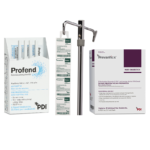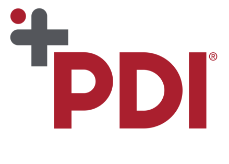Interventional Care


We notice that you are visiting us from . This site only services US-based visitors. Would you like to visit the site that is appropriate for your location?

PDI Healthcare provides the latest research, top stories, and trending topics in healthcare and surface disinfection news along with information from our Clinical team. PDI is invested in providing you with the most up-to-date information as it becomes available. Please continue to visit this page for ongoing updates.
SHEA/IDSA/APIC Methicillin-resistant Staphylococcus aureus (MRSA) Compendium Update
The Journal of Infection Control and Hospital Epidemiology has published the SHEA/IDSA/APIC Practice Recommendation: Strategies to prevent methicillin-resistant Staphylococcus aureus transmission in acute care hospitals: 2022 Update. The publication provides a concisely formatted resource showcasing the practical recommendations to help facilities prioritize the prevention of MRSA transmission and infection. As a sign of the times, antimicrobial stewardship has been reclassified from an unresolved issue to an essential practice. Among the different patient populations included in the update, decolonization protocols are discussed for adult ICU patients to reduce endemic MRSA, with a high quality of evidence to support the recommendation. In addition to universal protocols being found superior to screening and targeted decolonization protocols in the ICU, an iodophor may be the preferred agent when mupirocin resistance is of concern, or when using an agent that does not require a prescription is logistically favorable. The update in its entirety can be found at https://www.cambridge.org/core/journals/infection-control-and-hospital-epidemiology/article/sheaidsaapic-practice-recommendation-strategies-to-prevent-methicillinresistant-staphylococcus-aureus-transmission-and-infection-in-acutecare-hospitals-2022-update/5DB835D2E13F7E813A8A2FD7CB8386BD
SHEA/IDSA/APIC Surgical Site Infections (SSI) Compendium Update
The Journal of Infection Control and Hospital Epidemiology has published the SHEA/IDSA/APIC Practice Recommendation: Strategies to prevent surgical site infections in acute care hospitals: 2022 Update. The intent of the publication is to provide a concisely formatted resource showcasing the practical recommendations to help facilities prioritize their SSI prevention efforts. One of the practices that has been upgraded from an “additional approach” to an “essential practice” is the use of an anti-staphylococcal agent for cardiothoracic and orthopedic procedures (quality of evidence: high) and to decolonize patients undergoing other surgical procedures at high risk of staphylococcal SSI (quality of evidence: low). The update also mentions preliminary data to support the use of povidone-iodine (PVP) for nasal decolonization (alongside CHG bathing) prior to surgery, with an added antiseptic benefit (when compared to mupirocin) of no known resistance allowing for routine decolonization with a PVP agent. The update in its entirety can be found at https://www.cambridge.org/core/journals/infection-control-and-hospital-epidemiology/article/strategies-to-prevent-surgical-site-infections-in-acutecare-hospitals-2022-update/2F824B9ADD6066B29F89C8A2A127A9DC.
APIC Emerging Disease Task Force: Infection Prevention Playbook
The Association for Professionals in Infection Control and Epidemiology’s (APIC) Emerging Diseases Task Force has created Infection Prevention (IP) Playbooks to help prepare for and manage potential infectious disease outbreaks. This is an initiative born out of the confusion experienced by IPs at the beginning of the COVID-19 pandemic; the goal of these Toolbooks is to improve infectious disease outbreak response by streamlining mobilization, manage surges and highlight the role of infection prevention in emergency management. These playbooks are open access, can be downloaded and customized for use and provide recommended practices for the multiple phases of outbreak response. Content will continue to be updated and can be accessed at the following site: Emerging Infectious Diseases – APIC
WHO Preparedness & Resilience for Emerging Threat (PRET) initiative:
As the COVID-19 pandemic has made its impacts across the globe, many in public health are wondering if we are ready for another such event to occur. Born out of this concern, the World Health Organization (WHO) has developed the Preparedness and Resilience for Emerging Threats (PRET) initiative. The concept is to use systems and tools already in place, alongside global collaboration, to effectively respond to various groups of pathogens based on their mode of transmission, while prioritizing equity, inclusivity, and coherence. For more information regarding this initiative and what will be coming soon, please reference: https://www.who.int/initiatives/preparedness-and-resilience-for-emerging-threats
ICHE Compendium Updates, 2022:
The Strategies to Prevent Central-Line Associated Bloodstream infections in acute care hospitals was recently updated and published in ICHE as a SHEA/IDSA/APIC practice recommendation. This document, originally published in 2014, has been instrumental in providing best practice guidelines for the prevention of CLABSI in the acute care setting. The 2022 update provides added, removed, and altered “recommendations”, previously referred to as “best practices”, as well as provides additional approaches to be considered in hospital locations/patient populations where CLABSI prevention may not be successful with essential practices. Summary information regarding the updates to the 2014 document, as well as the guidelines in its entirety can be found here.
The Strategies to prevent ventilator-associated pneumonia, ventilator-associated events, and non-ventilator hospital-acquired pneumonia in acute-care hospitals was recently updated and published in May 2022. The purpose of this document is to provide recommendations in the acute care setting to prevent VAP, VAE and non-ventilator hospital-acquired pneumonia in adults, children, and neonates. Like the CLABSI prevention compendium update, the guidance is sponsored by SHEA/IDSA/APIC. As an IP, one update that caught my eye is the addition of daily toothbrushing and that CHG oral care is not a recommendation. The summary of document updates, as well as the guidelines in its entirety can be found here.
AHRQ Safety Program for MRSA Prevention
As mentioned in one of our previous posts, the Agency for Healthcare Research and Quality (AHRQ) is recruiting surgical services teams to participate in the Safety Program for MRSA Prevention. This is a free 18 month program with the goal of reducing surgical site infections (SSIs) with a special focus on methicillin-resistant Staphylococcus aureus (MRSA). This next AHRQ cohort will begin in January 2023 with the recruitment focus around cardiac, neurosurgical and orthopedic procedures. Participation provides surgical services teams with technical assistance, coaching, webinars, and tools to support and optimize their infection prevention program. For more information and to apply to the program please visit this website.
AHRQ: Surveys on Patient Safety Culture (SOPS) Nursing Home Survey:
AHRQ recently released a survey on patient safety culture (SOPS) in nursing homes to allow for internal facility assessment of patient safety performance. Currently, AHRQ also provides surveys in the following areas: hospitals, medical offices, community pharmacies, and ambulatory surgery centers. The survey is to capture the opinions of nursing home providers and staff regarding patient safety and healthcare quality. Questions are listed in sections according to topic: “Working in this Nursing Home”, “Communications”, “Your Supervisor”, “Your Nursing Home”, “Overall Ratings”, “Background Questions”, and a “Comments” section. AHRQ provides a complete toolkit for successfully administering the survey which includes the study form, survey items and composite measures, survey user’s guide, and additional resources such as an action planning tool, data entry, and analysis tool, FAQs, etc. This toolkit is beneficial for those facilities looking to enhance their patient safety and infection prevention programs. For more information on the survey and supporting toolkit please visit this website.
AHRQ Toolkit for Preventing CLABSI and CAUTI in ICUs:
The Agency for Healthcare Research and Quality (AHRQ) has recently released the new Toolkit for Preventing CLABSI and CAUTI in ICUs. This toolkit offers a blueprint to help reduce rates of CLABSI and CAUTI in ICUs via a culture of safety and evidence-based clinical practice. While ICUs understand how important prevention of infections is to patient safety, they may be indifferent to performance improvement stages to address their issues. AHRQ provides resources to address the various stages: those looking to initially access current best practices to prevent CLABSI and CAUTI, to those in the implementation stage who may need additional guidance throughout implementation, to those units who are struggling with common challenges and need actional solutions to overcome their local barriers. For more information on this comprehensive guidance please visit this website.
Agency for Healthcare Research and Quality (AHRQ):
AHRQ is currently seeking hospital ICUs and non-ICUs to join a national cohort to look at the impacts of MRSA bacteremia using evidence-based strategies and interventions. This is a FREE 18-month program, in conjunction with Johns Hopkins Medicine and the University of Chicago, beginning in April 2022. Expert coaching, online training, tools, and resources to help protect patients and bolster patient safety will be provided. Additional information and application details are available here.
Please note that while the ICU/non-ICU cohorts are recruiting now, this program includes two additional cohorts recruiting later in the year: the MRSA prevention program in surgical services recruiting in Summer 2022 and the MRSA prevention program in long-term care recruiting in Fall 2022.
CDC’s Project Firstline:
While not a research program, this training collaborative provides invaluable infection prevention education to frontline US healthcare and public health professionals. The program’s inception was due to the gaps in infection prevention practice highlighted by the COVID-19 pandemic. This training is available to professionals in a variety of different healthcare settings to empower healthcare workers in building their infection control knowledge. This program is funded by the American Rescue Plan for FY 2022-26. For more information click here.
The Success of CUSP at Henry Ford Hospital Hematology-Oncology Unit:
Henry Ford Hospital has been able to reduce CLABSI by 75% in the hematology-oncology unit by implementing AHRQ’s Comprehensive Unit-based Safety Program (CUSP). These really are fairly simple interventions to drive down infections, and most hospitals already have the tools to do this, they just may not have the structure in place. The utilization of patient safety science, evidence-based practice, and teamwork can go a long way! Read more here. For more information about the CUSP, Method click here.